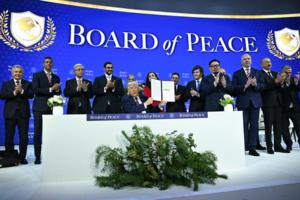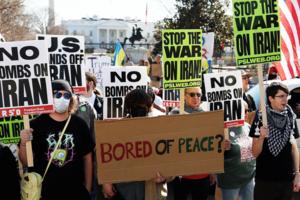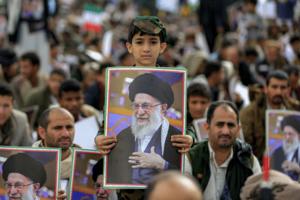Politics
/ArcaMax

Editorial: Trump's war of choice with Iran makes a mockery of the Constitution
Donald Trump, the president of war, keeps killing people at home and abroad.
Over the weekend, Trump presided over the assassination of Iran’s supreme leader. While many Iranians celebrated the end of Ali Khamenei’s 37-year reign of terror, the reckless gambit does not hide the fact that Trump violated the Constitution (again) by going to ...Read more

Commentary: Inside Iran, my family and other citizens are caught between celebration and fear
Early Saturday in Tehran, my father called me with his warm, steady voice to tell me that the attack had begun. As he always does, controlling his emotions carefully, he spoke calmly: “The war has started. They hit several places. But don’t worry — I’m fine.”
From that brief phone call, a moment filled with contradiction began. How ...Read more

Gene Collier: The Donald Trump guide to multi-national calamity
The last time an American president and his entourage of dissemblers face-planted into an international calamity, there was at least the courtesy of a meticulously produced pre-game show.
George W. Bush, who was routinely blistered for his suspect intellect, but looks like a cross between Copernicus and Abraham Lincoln compared to the ...Read more

Commentary: The economic common ground America isn't talking about
These days, it can feel like Americans across the political divide cannot agree on much of anything.
But there is encouraging news: When it comes to the economic foundations of human progress and flourishing, we are not as divided as we might think.
Political polarization has become a defining feature of American life. More and more people are...Read more

Commentary: How to bring down gas prices in California (Hint: Pumping oil won't help)
Growing up in California in the 1990s, I remember noticing gas prices along the drive to school. Any time the signs showed more than a dollar a gallon, we would hear the late great Bob Edwards on my parents’ car radio, interviewing energy experts on NPR’s “Morning Edition” about why costs were so high and when they’d come back down.
...Read more

Commentary: Donald Trump's tariff refund game to deny, delay and defy the Supreme Court
The Supreme Court ruled 6-3 that the $164.7 billion in tariffs collected under the International Emergency Economic Powers Act (IEEPA) was unlawful. In a constitutional system governed by judicial supremacy, such a decision should have marked the end of the matter. Instead, it has triggered a historic act of executive defiance.
Despite the ...Read more
POINT: Time changes have advantages year-round
America’s current daylight saving time system — spring-to-fall DST followed by winter standard time — is an excellent compromise, providing all of DST’s many benefits for the majority of the year and yet avoiding winter DST’s difficulties during the dark, cold months.
Evaluating DST is more complex than it might initially seem. Many ...Read more
COUNTERPOINT: Make year-long standard time the nationwide standard again
I’m one of the many Americans who hate being forced to time-shift twice a year. After only four months on standard time, daylight saving time returns with a vengeance on Sunday, March 8, when 2 a.m. abruptly becomes 3 a.m.
Only residents of Arizona (with the exception of those living on the land reserved for the Navajo Nation, which is ...Read more
POINT: The peace president's war
President Donald Trump entered his second term promising to measure America’s success not only by the battles we win but the ones we end. Operation Epic Fury has become the largest test of that vision. Trump’s critics call it a “war of choice.”
They are partly right. Trump has finally decided to end the 47-year war the Islamic Republic ...Read more

COUNTERPOINT: War with Iran means short-term and long-term damage
Few will mourn the demise of Iran’s supreme leader or other senior Iranian security officials who terrorized the Iranian people and destabilized countries across the region.
However, it is noteworthy that, save Israel, none of the countries in the region publicly supported military action against Iran. They understood that while Ayatollah ...Read more

Jenice Armstrong: Trump's reckless war proves his Board of Peace is a farce
New York Times-verified images from a scene in southern Iran are horrific. A severed arm of a child lying in the rubble. Backpacks covered in ashes. The dead in body bags. Video of rescue workers digging through the remains of what had been a modest, two-story school near a military installation in southern Iran.
Please stop for a moment and ...Read more

Editorial: Unclear war aims are a recipe for disaster in Iran
President Donald Trump’s decision to launch a major conflict with Iran is almost certainly his most consequential presidential decision to date, and may be the most important action of the U.S. government since former President George W. Bush’s Iraq War.
Yet while that conflict was preceded by several months of (often misleading or ...Read more

John Rash: One Iranian's perspective on his country's convulsions
“One Battle After Another” may be the odds-on Oscar favorite, but another nominee, for Best International Feature Film, says more about a society perpetually stressed by militarism. “It Was Just an Accident” comes from Iranian director Jafar Panahi, who channels his two terms in Tehran’s notoriously evil Evin prison into a plot about a...Read more

Commentary: The human cost of gun violence in America
I love coaching basketball. Being around young people, seeing their potential and helping them become the best versions of themselves is incredibly gratifying. But the job also offers a glimpse into how fragile it can all be. One injury, one bad break, a change in circumstances can shift everything for a player in a single moment.
Life is the ...Read more

Hal Brands: Israel has become America's not-so-secret weapon
The ongoing war against Iran has raised a number of important issues: the ability of air power alone to achieve regime change, the ethics and effectiveness of targeting Iran’s leaders, the question of how much damage the war will cause in the region, and what its effects will be around the globe.
But largely overlooked has been a historic ...Read more

Andreas Kluth: Trump doesn't want democracy in Iran or anywhere. He wants puppets
Absent a “real” strategy in his aggressive foreign policy, President Donald Trump is nonetheless revealing an emergent style or pattern. From Iran, which he is currently pounding, to Venezuela and perhaps Cuba and other countries, he’s not interested in building democracies, but in erecting puppet states.
“What we did in Venezuela, I ...Read more

Commentary: In wildfire country, EVs aren't a grid problem -- they're a power solution
When wildfire risk spikes in Southern California, the lights often go out before the flames arrive. Public safety power shutoffs have become a grim ritual: Utilities cut electricity to prevent sparking fires, leaving families without refrigeration, medical devices, internet access or a way to cool their homes during heat waves. For many in Los ...Read more

Editorial: White House offers muddled goals in Iran as Congress again stands aside
Can anyone reading this editorial right now explain, clearly and succinctly, why the U.S. is currently engaged in an open-ended military operation against the Islamic Republic of Iran?
If you said yes, congratulations — you’re doing better than the Trump administration. President Donald Trump and his advisers have offered nothing but ...Read more

Commentary: University should fight ruling on trans athletes
On Jan. 28, the Trump administration’s Department of Education Office for Civil Rights found that San José State University violated Title IX of the 1972 Education Amendments when it allowed a transgender athlete to compete in women’s sports.
Further, the Department of Education made several demands, including that the university adopt ...Read more

Commentary: A veterinarian's take on the Iditarod
As a veterinarian whose life purpose is to protect animals from harm and to treat those who need help, it pains me to know that in the coming days, dogs will suffer—and some will likely die—on the Iditarod trail.
Every March, Iditarod mushers make hundreds of dogs run up to 100 miles per day in freezing temperatures on icy trails and ...Read more




















































